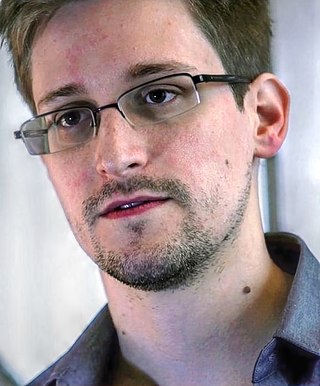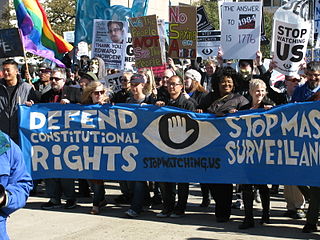
The National Security Agency (NSA) is an intelligence agency of the United States Department of Defense, under the authority of the Director of National Intelligence (DNI). The NSA is responsible for global monitoring, collection, and processing of information and data for foreign intelligence and counterintelligence purposes, specializing in a discipline known as signals intelligence (SIGINT). The NSA is also tasked with the protection of U.S. communications networks and information systems. The NSA relies on a variety of measures to accomplish its mission, the majority of which are clandestine. The NSA has roughly 32,000 employees.

Jewel v. National Security Agency, 673 F.3d 902, was a class action lawsuit argued before the District Court for the Northern District of California and the Court of Appeals for the Ninth Circuit, filed by Electronic Frontier Foundation (EFF) on behalf of American citizens who believed that they had been surveilled by the National Security Agency (NSA) without a warrant. The EFF alleged that the NSA's surveillance program was an "illegal and unconstitutional program of dragnet communications surveillance" and claimed violations of the Fourth Amendment.

The Internet Defense League is an organization and network launched in March 2012 with the aim of organizing protests and other responses to perceived threats to Internet freedom and the open Internet. It was formed following the protests against SOPA and PIPA. It had 30,000 members as of 2013, consisting of organizations, websites, and individuals.
Fight for the Future is a nonprofit advocacy group in the area of digital rights founded in 2011. The group aims to promote causes related to copyright legislation, as well as online privacy and censorship through the use of the Internet.

PRISM is a code name for a program under which the United States National Security Agency (NSA) collects internet communications from various U.S. internet companies. The program is also known by the SIGAD US-984XN. PRISM collects stored internet communications based on demands made to internet companies such as Google LLC and Apple under Section 702 of the FISA Amendments Act of 2008 to turn over any data that match court-approved search terms. Among other things, the NSA can use these PRISM requests to target communications that were encrypted when they traveled across the internet backbone, to focus on stored data that telecommunication filtering systems discarded earlier, and to get data that is easier to handle.

Edward Joseph Snowden is an American whistleblower who became a naturalized Russian citizen in 2022. In 2013, while working as a government contractor, Snowden leaked highly classified information from the National Security Agency (NSA). He is currently under indictment for espionage. His disclosures revealed numerous global surveillance programs, many run by the NSA and the Five Eyes intelligence alliance with the cooperation of telecommunication companies and European governments and prompted a cultural discussion about national security and individual privacy.

The practice of mass surveillance in the United States dates back to wartime monitoring and censorship of international communications from, to, or which passed through the United States. After the First and Second World Wars, mass surveillance continued throughout the Cold War period, via programs such as the Black Chamber and Project SHAMROCK. The formation and growth of federal law-enforcement and intelligence agencies such as the FBI, CIA, and NSA institutionalized surveillance used to also silence political dissent, as evidenced by COINTELPRO projects which targeted various organizations and individuals. During the Civil Rights Movement era, many individuals put under surveillance orders were first labelled as integrationists, then deemed subversive, and sometimes suspected to be supportive of the communist model of the United States' rival at the time, the Soviet Union. Other targeted individuals and groups included Native American activists, African American and Chicano liberation movement activists, and anti-war protesters.

During the 2010s, international media reports revealed new operational details about the Anglophone cryptographic agencies' global surveillance of both foreign and domestic nationals. The reports mostly relate to top secret documents leaked by ex-NSA contractor Edward Snowden. The documents consist of intelligence files relating to the U.S. and other Five Eyes countries. In June 2013, the first of Snowden's documents were published, with further selected documents released to various news outlets through the year.

The global surveillance disclosure released to media by Edward Snowden has caused tension in the bilateral relations of the United States with several of its allies and economic partners as well as in its relationship with the European Union. In August 2013, U.S. President Barack Obama announced the creation of "a review group on intelligence and communications technologies" that would brief and later report to him. In December, the task force issued 46 recommendations that, if adopted, would subject the National Security Agency (NSA) to additional scrutiny by the courts, Congress, and the president, and would strip the NSA of the authority to infiltrate American computer systems using "backdoors" in hardware or software. Geoffrey R. Stone, a White House panel member, said there was no evidence that the bulk collection of phone data had stopped any terror attacks.
The Fourth Amendment Protection Acts, are a collection of state legislation aimed at withdrawing state support for bulk data (metadata) collection and ban the use of warrant-less data in state courts. They are proposed nullification laws that, if enacted as law, would prohibit the state governments from co-operating with the National Security Agency, whose mass surveillance efforts are seen as unconstitutional by the proposals' proponents. Specific examples include the Kansas Fourth Amendment Preservation and Protection Act and the Arizona Fourth Amendment Protection Act. The original proposals were made in 2013 and 2014 by legislators in the American states of Utah, Washington, Arizona, Kansas, Missouri, Oklahoma and California. Some of the bills would require a warrant before information could be released, whereas others would forbid state universities from doing NSA research or hosting NSA recruiters, or prevent the provision of services such as water to NSA facilities.

The Day We Fight Back was a one-day global protest against mass surveillance by the US National Security Agency (NSA), the UK GCHQ, and the other Five Eyes partners involved in global surveillance. The "digital protest" took place on February 11, 2014 with more than 6,000 participating websites, which primarily took the form of webpage banner-advertisements that read, "Dear Internet, we're sick of complaining about the NSA. We want new laws that curtail online surveillance. Today we fight back." Organizers hoped lawmakers would be made aware "that there's going to be ongoing public pressure until these reforms are instituted."

The USA Freedom Act is a U.S. law enacted on June 2, 2015, that restored and modified several provisions of the Patriot Act, which had expired the day before. The act imposes some new limits on the bulk collection of telecommunication metadata on U.S. citizens by American intelligence agencies, including the National Security Agency. It also restores authorization for roving wiretaps and tracking lone wolf terrorists. The title of the act is a ten-letter backronym that stands for Uniting and Strengthening America by Fulfilling Rights and Ensuring Effective Discipline Over Monitoring Act of 2015.

The FISA Improvements Act is a proposed act by Senator Dianne Feinstein, Chair of the Senate Intelligence Committee. Prompted by the disclosure of NSA surveillance by Edward Snowden, it would establish the surveillance program as legal, but impose some limitations on availability of the data. Opponents say the bill would codify warrantless access to many communications of American citizens for use by domestic law enforcement.

Stop Watching Us was a protest effort against global surveillance that culminated in rallies on October 26, 2013.

Proposed reforms of mass surveillance by the United States are a collection of diverse proposals offered in response to the Global surveillance disclosures of 2013.

Klayman v. Obama, 957 F.Supp.2d 1, was a decision by the United States District Court for District of Columbia finding that the National Security Agency's (NSA) bulk phone metadata collection program was unconstitutional under the Fourth Amendment. The ruling was later overturned on jurisdictional grounds, leaving the constitutional implications of NSA surveillance unaddressed.

Former U.S. President Barack Obama favored some levels of mass surveillance. He has received some widespread criticism from detractors as a result. Due to his support of certain government surveillance, some critics have said his support violated acceptable privacy rights, while others dispute or attempt to provide justification for the expansion of surveillance initiatives under his administration.

American Civil Liberties Union v. Clapper, 785 F.3d 787, was a lawsuit by the American Civil Liberties Union (ACLU) and its affiliate, the New York Civil Liberties Union, against the United States federal government as represented by then-Director of National Intelligence James Clapper. The ACLU challenged the legality and constitutionality of the National Security Agency's (NSA) bulk phone metadata collection program.
Commentary on Edward Snowden's disclosure is part of the reactions to global surveillance disclosures made by Edward Snowden.












